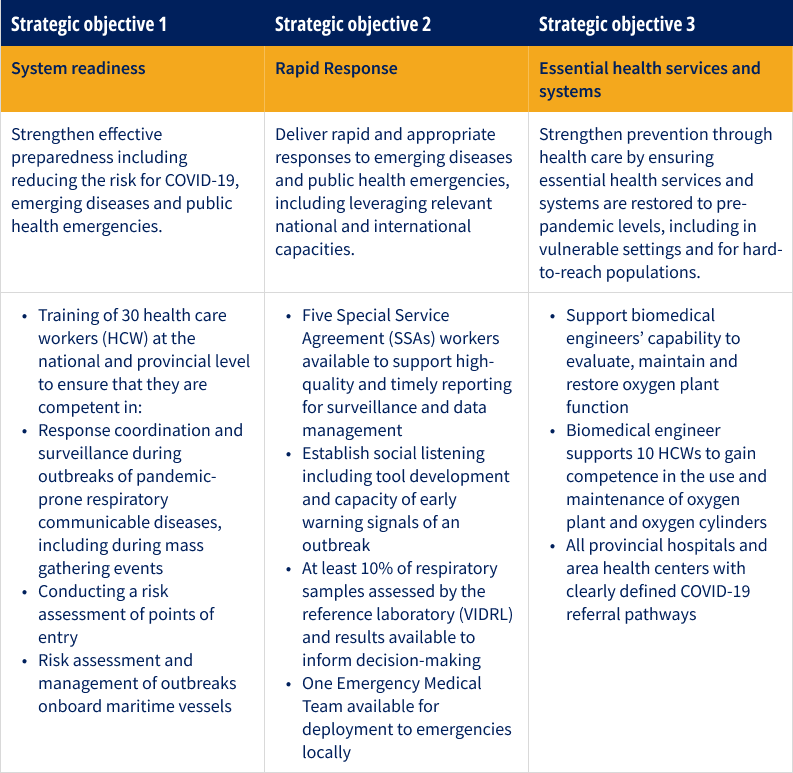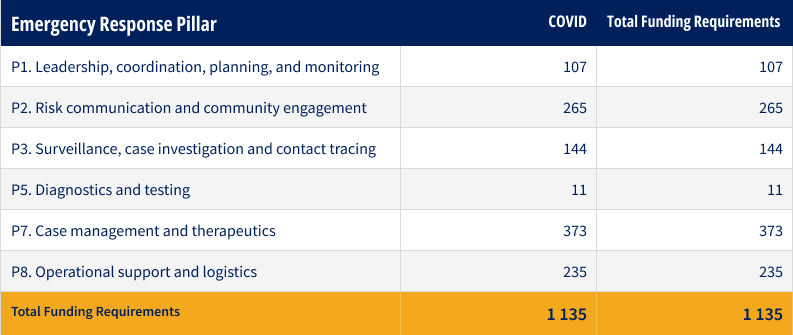
Solomon Islands
Solomon Islands
Context
The Solomon Islands remained COVID-19-free until the first locally transmitted case was detected on 15 January 2022. The outbreak later spread to nine of the 10 provinces, with extensive hospitalizations and more than 25 000 documented cases. Diagnoses were carried out with a combination of polymerase chain reaction (PCR) and antigen rapid detection tests. The ongoing COVID-19 pandemic continues to put a strain on the human, material and financial resources of the Ministry of Health and Medical Services (MHMS) of the Solomon Islands.
While the outbreak has been successfully contained, the re-opening of international and domestic borders has increased the risk of ongoing transmission of current and new SARS-COV-2 variants of concern, as well as other infectious and pandemic-prone diseases. Preparations are underway for hosting the Pacific Games (19 November - 2 December 2023) in Honiara. This adds additional risks for transmission. MHMS conducted an intra-action review (IAR) of the COVID-19 response in May 2022 which revealed challenges in risk assessments, especially for mass gatherings and maritime vessels. It further identified gaps in the early warning system and the need for better integration of emergency responses into routine health services. Limited human resources (including specialized technical capacity) at the national and provincial levels further complicate the ongoing response.
The Solomon Islands was ranked as the second most disaster-prone country in the world, by the World Risk Report 2021. Due to its geography, the country is prone to natural hazards and climate change impacts that continue to pose threats to urban centers and rural communities countrywide. Natural hazards such as cyclones, earthquakes, tsunamis and flooding have already impacted the population. Health emergencies have been associated with recent disaster events including the 2019 oil spill, the Honiara flash flooding in 2014 and two tsunamis in 2007 and 2013 (Western Province and Santa Cruz, respectively), which have significantly impacted the health sector, infrastructure and the population in general. The country is also affected by environmental disasters such as maritime accidents and new and emerging health threats associated with man-made and climate-related changes.
Emergency response
The Solomon Islands is working towards risk-based approaches for the sustained management of COVID-19. This is in the context of new and emerging threats in addition to ongoing threats from endemic communicable diseases and a fragile health system, stretched by multiple and concurrent health emergencies in the past three years. These include outbreaks of dengue fever, malaria and health threats from natural disasters including floods and tsunamis. WHO’s work in the Solomon Islands aims to strengthen readiness for outbreaks and surges in COVID-19 cases while optimizing systems for longer-term risk-based management of COVID-19 and other emerging diseases and health emergencies. WHO’s work draws on lessons learned from the response to previous and current waves of outbreaks. Additionally, WHO supports the prevention and mitigation of outbreaks linked to the 2023 Pacific Games.
Activities will include strengthening International Health Regulations (IHR) (2005) core capacities and core systems required for managing COVID-19 and other public health emergencies. To mitigate challenges posed by the Pacific Games, activities will focus on the following pillars:
- Leadership, coordination, planning, monitoring and surveillance
- Risk communication and community engagement
- Research, innovation and evidence
- Travel, trade and points of entry
- Diagnostics and testing
- Case management and therapeutics
- Operational support and logistics
Strategic objectives


Key activities
Expert support to develop and deliver competency-based coaching and simulation exercises to:
- Prepare and respond to outbreaks of pandemic-prone communicable diseases, including during mass gathering events
- Conduct risk assessments of points of entry
- Assess risk and manage outbreaks onboard maritime vessels
- Support for ongoing human resources for improved surveillance, reporting and data management
- Technical support for the development of social listening and other tools for risk communication and community engagement for COVID-19
- Support for procurement, logistics and supply chain management including for essential medicines and health technologies, as well as for transportation of clinical samples to referral laboratories
- Emergency Medical Team training and deployment to remote areas for outbreaks of COVID-19 and other pandemic-prone diseases Evaluate readiness and response to preventing mass outbreaks during and following the Pacific Games
- Build biomedical capacity for the use and maintenance of oxygen and other medical equipment Strengthen COVID-19 referral pathways for hard-to-reach populations
- Innovative approaches will use adult-learning methodologies (such as competency-based coaching and simulations) to sustainably strengthen human
Funding requirements (US$’000)


Success stories
Strengthening national COVID-19 preparedness and response capabilities
The spread of COVID-19 across nine of the Solomon Island's 10 provinces has placed significant pressure on the country's Ministry of Health and Medical Services' (MHMS) human, material and financial resources. Following the Initial peak of the outbreak, over 25 000 cases were recorded, with extensive hospitalizations. To strengthen national COVID-19 preparedness and the country's capacity to respond to emergency situations, WHO provided technical and financial support to the Solomon Islands Ministry of Health and Medical Services (MHMS). This enabled the MHMS to contain the first wave of the outbreak in February, and in April 2022, to predict and improve the response to a smaller second wave.
This ongoing support has enabled the MHMS to improve various aspects of their response coordination, health operations and epidemiological analysis of surveillance data to inform response planning and resource allocation, rollout of COVID-19 vaccines and support for logistics and supply chain management.
WHO has also made a significant contribution to the development and delivery of the MHMS’ first Intra-Action Review (IAR) of the COVID-19 response, covering the period of January to April 2022.
For more information
Dr. Howard Sobel | WHO Representative | Solomon Islands | sobelh@who.int

